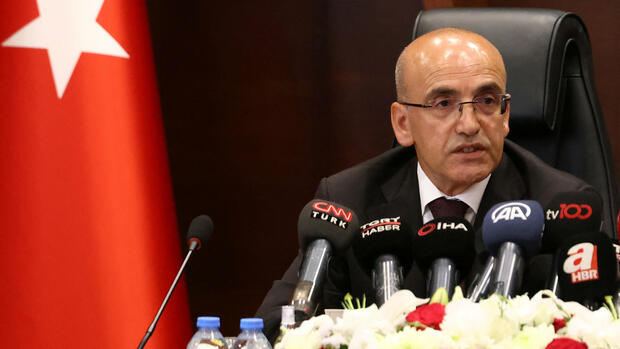The markets have already speculated on this: state intervention is falling under the new finance minister.
(Photo: Reuters)
Istanbul The Turkish lira fell the most against the US dollar on Wednesday, the most in more than a year. Traders reported that the state-owned banks have stopped their supportive purchases – buying lira and selling dollars.
The lira recorded its biggest daily loss in two years on Wednesday morning. In contrast, the dollar and euro rose by around seven percent each to record highs of 23.185 and 24.824 lira respectively.
Before the presidential election in Turkey at the end of May, which ended with Recep Tayyip Erdogan being re-elected, state banks had supported the lira for months, primarily with the aim of boosting the purchasing power of Turks before the elections. However, this strategy had depleted the central bank’s reserves.
In mid-May, official central bank data showed that net foreign reserves fell to $2.33 billion ahead of the election. This is the lowest level in over 20 years.
Turkey’s state banks have not commented on their interventions in the foreign exchange market. The lira has lost more than 12 percent against the dollar since the second round of Turkey’s elections on May 28.
This means that the appointment of Mehmet Simsek as Treasury and Finance Minister has fizzled out for the time being. The former Merrill Lynch strategist, who was Treasury Secretary in 2009 and 2018, announced his country’s return to “rational fundamentals” in economic and financial policy over the weekend.
“A finance minister does not make a monetary policy summer”
Such a return to more orthodox economic policies with less government intervention should theoretically support the lira. But investors are obviously still skeptical about how sustainable the turnaround in Turkey will be, explains Commerzbank expert Ulrich Leuchtmann: “A finance minister doesn’t make a monetary policy summer.”
The appointment is “perhaps a necessary but by no means a sufficient condition for an actual permanent U-turn in monetary policy,” says Leuchtmann, recalling the year 2018. At that time, a change of course proved to be only temporary. “Market participants don’t forget such painful experiences that quickly, it seems to me,” says Leuchtmann.
downtrend
20.3
percent
the lira has lost at its peak against the dollar since the beginning of the year. (Source: Refinitiv)
Markets are now awaiting the appointment of a new central bank governor. Because Turkey is in a crisis and is struggling with high inflation, which was at times more than 85 percent last year. One reason for this is that the central bank did not raise the key interest rate in accordance with economic theory, but lowered it at Erdogan’s request.
In view of Erdogan’s economic and monetary policy, the Turkish lira has fallen by around 20 percent against the dollar since the beginning of the year. In 2021 and 2022, it fell by 44 and 30 percent, respectively. The weak national currency makes imports, on which the resource-poor country depends, noticeably more expensive.
Analysts at Goldman Sachs warn that the fall in the exchange rate could continue. The experts at the US bank recently revised their forecast for the exchange rate of the lira against the dollar upwards, citing the increasing pressure on the currency as the reason for this.
A correction towards rational economic policy?
According to a June 3 report, the bank expects the lira to depreciate to 28 lira per dollar in 12 months, instead of the 22 lira per dollar the bank originally forecast. Commerzbank is currently even assuming an exchange rate of 30 lira per dollar by the end of 2024.
However, a weaker currency could help with another problem: the trade deficit. This had been boosted by the central bank’s support purchases.
That should change now. Because when the exchange rate weakens, households and companies generally buy less abroad. This reduces the country’s imports. At the same time, exports are increasing because products are becoming cheaper abroad. Overall, the trade deficit is reduced and as a result, the pressure on the national currency decreases.
The current lira weakness could therefore be a necessary correction needed for Simsek’s return to rational economic policy.
With material from Bloomberg and Reuters.
More: Turkey is nearing ratification of Sweden’s NATO bid
